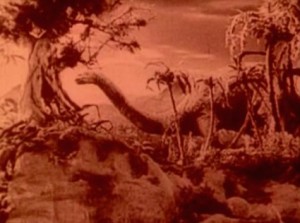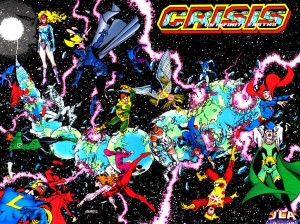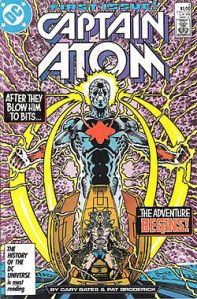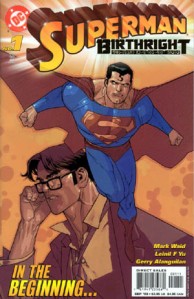The past is a work-in-progress.
Look at dinosaurs. When I was kid, brontosaurus was a lethargic lizard so obese it wallowed in swamps to support its weight. Read Lost World—Conan Doyle’s, not Michael Crichton’s—and T Rex is an enormous bullfrog. Nowadays sauropods are lithe warm-bloods with whip-action tails, and the former King of the Dinosaurs is a queen of scavengers.
It’s sad to see the old guys go, but a revisable history is a good thing. It’s evolution in action. Old paradigms die out as newer, fitter interpretations replace them. And no one knows that better than the comic book industry. Back in the early 80s, DC was so bogged down in lost worlds—Earth 2, Earth 32, Earth 387, Earths A, B, C and C-, Earth Prime, Earth X, Earth Quality—their writers couldn’t move under the weight of the multiverse. Something had to give.
Enter Crisis on Infinite Earth, king of all scavengers. The 1985-6 maxi-series chomped through decades of DC history, swallowing the Golden, Silver, and Bronze Ages and spitting them back out as one shiny new Earth called, well, New Earth.
It was more than just a reboot. DC had already done that in the late 50s, evolving its old guys into new costumes and origins. But their new New Earth arrived with a whole history. Literally. I bought a copy from my college comics shop. Suddenly I was being told that characters I’d never heard of—the Question, Captain Atom, Peacemaker, Blue Beetle—had always been around, paling with the usual Justice Leaguers.
I thought: Captain who?
The answer was simple. He and his friends were the scavenged imports from Charlton Comics, DC’s latest business acquisition. But instead of setting the new roster up on their own multiverse planet—Earth Charlton—they wove them in post-Crisis. And readers just had to swallow them.
And keep swallowing. Because Crisis was just a gateway drug. Soon DC was rewriting its past every decade or so, constantly reimagining character histories with forward-looking updates to satisfy new fans. But to get the old high—that euphoric sales boost—the dose kept climbing. So for their 2012 re-write, the newest of the New Earths restarted its titles on the rock bottom foundation of “No.1.” But not its history. That’s still a shifting swamp.
Maybe it’s the influence of comic books on larger culture trends, or maybe comics make explicit a process that might otherwise go less noticed, but superhero history is not the only history in crisis.
After a landslide election in Japan last December, New York Times commentator Paul Krugman wrote: “In Japan governments come and governments go, but nothing ever seems to change — indeed, Shinzo Abe, the new prime minister, has had the job before, and his party’s victory was widely seen as the return of the ‘dinosaurs’ who misruled the country for decades.”
But this time the dinosaur king returns with a revisionist pen. Prime Minister Abe wants to replace Japan’s 1995 apology for the suffering it caused in Asia during World War II with a “forward-looking statement that is appropriate for the 21st century.”
That’s the assignment DC gave Mark Waid in 2002: “reimagining Superman for the 21st century.” But the secret mission behind Superman: Birthright was to align DC’s comic book continuity with the popular TV show Smallville. The same way Abe wants to align his nation’s apology—issued by a Socialist Party Prime Minster—with his newly repopularized brand of hawkish conservativism.
When Abe was Prime Minster in 2006, he revised an education law to “restore patriotism” in schools. That’s the same year China started writing Mao out of their own school texts. The Marxist template that dominated Chinese history since the 50s had grown too obese to support—and, frankly, a little embarrassing. Like Superman’s pet super-monkey from the 50s. Better if he’d never been there in the first place. Mao who?
U.S. textbooks are no different. Look at Texas. In 2009, their state board approved a science curriculum championed by a chair who said “evolution is hooey.” Their 2010 Social Studies guidelines were guided by a board-appointed consultant who opposed income taxes because they violate Scriptures. Every state in the country fights some version of these battles, with every subject in perpetual flux. Curricula keep evolving. They always have. Go back to the 30s, and most Biology and Social Studies textbooks preached eugenics, a fact conveniently missing from, say, my kids’ middle school and high school history books.
And, what the hell, Scriptures are revisable too. In March, the Mormon Church issued a new and improved edition of its book of Doctrine and Covenants. Turns out the ban on black priests wasn’t the will of God but a human misstep. Ditto for multiple wives, since monogamy is now God’s standard for marriage. It’s not exactly a reboot (Bingham who?), but certainly a refresh. The Mormon Church, like DC, is aligning itself with the 21st century. You could say it’s just another business decision, a way of grounding a fan base, but I wish the Catholic Church would revise a few scriptures too. Polygamy and racism aren’t the only dinosaurs that need to die out.
“What we’re seeing with these changes,” according to religion professor Terryl Givens, “is the privileging of history over theology. It’s a kind of acknowledgement that the Mormon Church is rooted in a past that is replete with historical claims.”
That means multiple and contradictory claims, a bog of them. Comic books are rooted in the same muck, but since all those histories are overtly make-believe, only fans feel it when the foundation shifts. But that’s useful training. Out here on the non-spandex-wearing Earth, we have pastquakes all the time. Our multiverse is pocked with lost worlds.
If we’re going to keep rebooting, we should be as upfront about it as DC and the Mormon Church. Change what you like, but don’t pretend you’re getting away with anything. And don’t forget the next breed of writers is waiting behind you, their whip-action pens uncapped.




Brigham. (Not a Mormon, just a nitpicker.)
Thanks, David. I recently assigned a section of Varick Vanardy’s “The Night Wind”(alter ego Bingham Harvard), but that’s not much of an excuse.
So you saw the Economist cover with Shinzo Abe dressed as superman too, eh?
Weirdly, subdee, this is complete coincidence. Here’s the link to the Economist if anyone else is interested.
http://www.economist.com/news/leaders/21578044-shinzo-abe-has-vision-prosperous-and-patriotic-japan-economics-looks-better
Obviously you don’t understand Mormon belief about scripture or this would not come as a surprise. The last thing Mormons believe in is that the Word of God is static, even if put down on paper. Revision is part of its doctrine or there wouldn’t be much use for modern prophets.